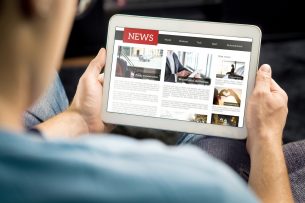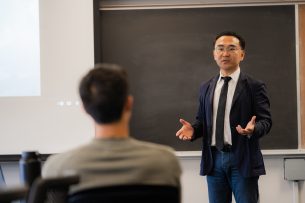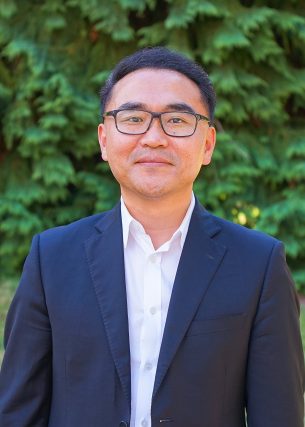
For years, researchers have grappled with understanding the relationship between technology and political behavior, proposing various models to explain how exposure to information and engagement with technology shapes citizens’ attitudes and actions. These models, however, have often yielded conflicting results, leaving unanswered questions about the true nature of this relationship.…
Read more
A new study has found that perceived AI ethics can play a vital role in mediating between self-efficacy and technological factors and lead to a more positive attitude toward AI technologies. The findings by Seungahn Nah, Dianne Snedaker Chair in Media Trust and research director for the Consortium on Trust…
Read more
The majority of people in the United States get their online news from websites or apps, like Newsweek or the New York Times, which publish proprietary stories written by their own reporters. Compare these news platforms to South Korea, where an overwhelming number of people access news portals, which aggregate…
Read more
A new study has found that although artificial intelligence (AI) news differs from human news, machine-generated news is not necessarily more biased compared to human news regarding gender and race/ethnicity. The findings by Seungahn Nah, Dianne Snedaker Chair in Media Trust and research director for the Consortium on Trust in…
Read more
Seungahn Nah, Dianne Snedaker Chair in Media Trust and research director for the Consortium on Trust in Media and Technology at the University of Florida College of Journalism and Communications (UFCJC), and UCLA Communication Associate Professor Jungseock Joo are the co-editors of “Rethinking Artificial Intelligence (AI): Algorithmic Bias and Ethical…
Read more
A new study has found that frequent consumption of artificial intelligence (AI)-related news amplifies political discussion about AI and leads to increased AI literacy and support of AI policies and regulation. The findings by University of Florida College of Journalism and Communications (UFCJC) doctoral students Fanjue Liu and Heidi Makady,…
Read more
Seungahn Nah, Dianne Snedaker Chair in Media Trust and research director for the Consortium on Trust in Media and Technology at the University of Florida College of Journalism and Communications (UFCJC), is the editor of the Research Handbook on Artificial Intelligence and Communication. The Handbook is a collection of studies…
Read more
Four University of Florida College of Journalism and Communications (UFCJC) faculty and two doctoral students are included in the Research Handbook on Artificial Intelligence (AI) and Communication edited by Seungahn Nah, Dianne Snedaker Chair in Media Trust and research director of the UF’s Consortium on Trust in Media and Technology.…
Read more
Jasmine McNealy, University of Florida College of Journalism and Communications Media Production, Management, and Technology associate professor, is author of “Design + Power: Policy for Ecology of Influence,” a chapter in the Research Handbook on Artificial Intelligence (AI) in Communication edited by Seungahn Nah, Dianne Snedaker Chair in Media Trust…
Read more
A new study has found that active use of news portals positively predicts online community discussion to subsequently increase cognitive, psychological and behavioral dimensions of civic engagement. The findings by Seungahn Nah, Dianne Snedaker Professor in Media Trust and research director of the UF’s Consortium on Trust in Media and…
Read more
Seungahn Nah’s curiosity hooked him on the path of research and took him from an internship in South Korea’s National Assembly in the mid-1990s to pursue academia in the United States. “I enjoy being curious about something new,” said Nah, a Journalism professor, the inaugural Dianne Snedaker Chair in Media…
Read more
Diane Snedaker Chair in Media Trust and Research Director, Consortium on Trust in Media and Technology What will you be teaching? I don’t teach this fall, but will be teaching a new course entitled “AI, Social Media and Democracy” in spring 2023, which will focus on what AI can do…
Read more